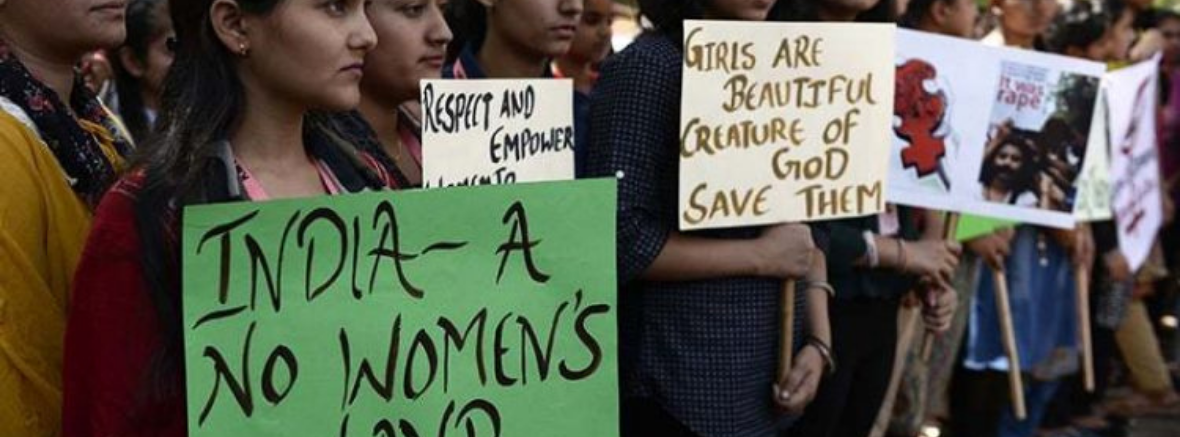Is Marital Rape Real?
Rape – a word to define a violent and ghastly act. I believe that there are not enough words in the English language to perfectly describe rape. No words to embody the nastiness of the crime and of the criminal. No words to convey the trauma that survivors go through for the rest of their lives. However, for your understanding, I will define it in simple terms. Rape is unlawful sexual activity (sexual penetration) that occurs without the consent of the victim.
In the world’s second biggest populated country, India, rape is rampant. It happens among all classes of society, often behind closed doors. A rapist can be anyone; from a stranger, to the next-door neighbour, a childhood friend, or even one’s husband.
It might be difficult to think of spouses as perpetrators. After all, marriage is supposed to be a holy institution. Your partner is supposed to be your safe space for the rest of your married life. Especially in India, where only 1% of marriages end in divorce. This often means for the rest of your life. Unfortunately, spousal violence is a prevalent problem in India. The National Family Health Survey 2015-16 revealed that 33% of ever-married women underwent spousal violence. In fact, 83% of married women who have ever gone through sexual abuse cited their current husbands as their abusers. 6% of women reported having been physically forced to have sexual intercourse with their husbands. This shows that rape occurs within marriages too. Rape within a marriage is called marital rape. Marital rape is a problem worthy of attention in India. .
Is Marital Rape A Legal Crime?
Indian Penal Code (IPC), section 375 governs rape. Section 375 states: ‘A man is said to commit rape if he penetrates (oral included) a woman or makes her do so with him or any other person, without her valid and fully-informed consent.’ As per this definition, any man (including a husband) can commit the crime. However, the problem arises with a statutory exception to section 375; the marital rape exception. Exception 2 of section 375 states that: ‘Sexual intercourse or sexual acts by a man with his own wife, the wife not being under *fifteen years of age, is not rape.’ *It’s eighteen years starting October 2017.
This means the law does not recognize marital rape as a crime legally. A husband raping his wife is not a crime. There are other sections in IPC under which a husband may be punished for marital rape. For one, section 498A criminalises cruelty against wives.
Legal Journey Towards Criminalizing Marital Rape
Since colonial times, Indian laws have excluded marital rape as a crime. However, laws and legislations constantly evolve with time. IPC’s definition of rape and idea of sexual offences have evolved with time too. One of the most recent monumental updates is the Criminal Law (Amendment) Act 2013 or the Nirbhaya Act.
People were outraged after the Nirbhaya rape case of 2012. There was much pressure on lawmakers and the government to update rape laws. The then government formed a panel to review the law. The Nirbhaya Act drew from the panel’s report. The report suggested removing the marital rape exception to section 375. Unfortunately, the Nirbhaya Act still failed to do so. It just amended the definition of rape and included new sexual offences.
“Criminalisation of marital rape would disturb family systems and upset the institution of marriage. Recognition of marital rape would give women power to bring forth false claims.” Lawmakers and the governement argued against criminalizing marital rape.
In 2017, the Government yet again objected to the removal of the marital rape exception. Today, marital rape is in the news again due to petitions brought forth in the Delhi High Court. Petitioners, who include RIT Foundation and All India Democratic Women’s Association, are challenging the marital rape exception. The matter is not so straightforward for the Court to make a decision. This is because it may not be in the power of the Court to arrive at such a decision. If the Court calls for removal of the exception, it might amount to the creation of a new offence. This exceeds the power granted to them as the judiciary. Only the legislature can create a new offence; the Parliament. The Court has the power to deem the exception unconstitutional, but only the Parliament can remove it.
This tosses the ball again into the court of the Government and the Parliament. The Central Government has asked the Court to delay the hearings in the case. In an affidavit, the Government has requested the Court to await the results of their consultation with concerned stakeholders. The Government believes that they need to have a thorough consultative process with all stakeholders before taking a major decision. According to them, a court case with few affected parties will do no proper justice. The case is still ongoing, so as of now, the marital rape exception is still effective.
Public Opinion For Or Against Criminalization
One might expect that the public would rejoice at the idea of criminalization of marital rape. On the contrary, there’s different opinions. There are obviously the people pushing for the criminalisation of marital rape. Women’s rights groups and advocates have been vocal for years about the need for it. Two petitioners of the court case themselves are gender equality advocacy groups.
On the other hand, there are groups advocating against the criminalisation of marital rape. They believe that criminalisation would give women power to make false allegations. These men’s rights groups started trending #MarriageStrike on social media to raise their voices. They announced that they would go on a strike from marriage as a form of protest.
It is worth noting though that domestic violence is already a crime. Marital rape is just an extreme form of such violence. Criminalisation of marital rape would not be recognizing something completely new. There’s also a vast number of people who lack education and awareness about marital rape.
Some people think of rape only as visible violence. They think that rape is a crime only when the survivor has visible physical scars. For some others it is ‘forced sexual intercourse’. And then there are those who believe that such a violent crime cannot be committed within the holy boundaries of marriage. Marriage may be a ‘holy’ institution. However, the two people in a marriage are human.
As humans, they have separate basic human rights even within the marriage. As humans, they are also capable of breaching each other’s rights. Marriage does not imply consent. We are a long way from the end of the road. For one, we need to educate the public about bodily autonomy, consent and human rights. We still need to empower women to stand up for themselves. Fighting against violence against women is a never-ending battle.
About The Author

Layaal Ali is a Maldivian law student currently residing in Malaysia. A staunch feminist, she believes strongly in bringing down the patriarchy. She enjoys reading good books, and writing about women’s rights.
Blog Photo Credit: Shammi Mehra, AFP Photo
